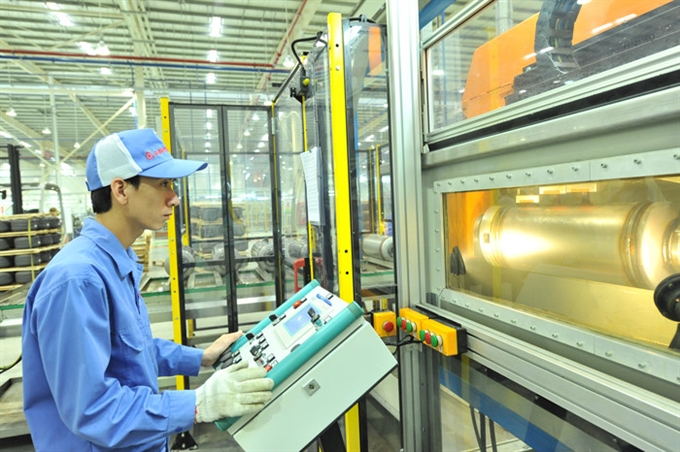 Economy
Economy

Vietnamese businesses should be active in seeking information about markets to further penetrate into distribution systems abroad to improve their export turnover, a minister has said.
 |
| Vietnamese businesses should be active in seeking information about markets to further penetrate into distribution systems abroad to improve their export turnover, a minister has said.— Photo baodauthau.vn |
HÀ NỘI – Vietnamese businesses should be active in seeking information about markets to further penetrate into distribution systems abroad to improve their export turnover, a minister has said.
“Several local firms have been waiting for orders instead of directly seeking information from markets and listening to response from their partners. This could make them lose several business opportunities which could benefit from Free Trade Agreements (FTAs),” Trần Quốc Khánh, deputy minister of Industry and Trade (MoIT) said.
Khánh told the seminar, “EU-Viet Nam Free Trade Agreement (EVFTA): Opportunities for Businesses” held in Hà Nội yesterday that each firm should prepare itself with an active action plan in the aspects of market orientation, partners, renewing production and administration methods, together with corporate social responsibility and business culture.
“There could be different market segments in the Asian region, but the European market is quite united. The only way for local firms to penetrate into the market is to ensure high quality,” he added.
In addition, consumers in the European Union (EU) have always paid attention to the environment and ensuring benefits to labourers. For this reason, Vietnamese exporters should note the requirements to ensure higher export turnover in the market.
Việt Nam and the EU have a supporting export structure. Việt Nam exported to the EU products such as garments and textiles, shoes, phones and spare parts, in addition to computers, agricultural, seafood and wooden products, while it imported machines, vehicles, and spare parts from the EU.
Over the past decades, the EU-Việt Nam trade and investment relations have witnessed remarkable progress. The two-way trade between the EU and Việt Nam has increased nearly seven-fold from US$6.3 billion in 2003 to $41.2 billion in 2015, making the EU one of Việt Nam’s biggest trade partners.
Specifically, Vietnamese exports to the EU reached almost $31 billion and its imports from the EU, more than $10 billion. One significant characteristic of the trade between the two sides is its complementary nature, rather than direct competition.
In terms of investment, the EU is also a major investor in Việt Nam and has funded 1,809 valid projects with total registered capital of $23.16 billion, accounting for 8.7 per cent of the projects and for 8 per cent of the total registered capital in the country.
However, a survey of the Central Institute for Economic Development (CIEM) shows that around 30 per cent of private firms had no plans in place to increase their business operations for their EU partners. Some did not even pay attention to renewal plans for long-term strategies.
“The Government should further improve awareness of businesses in implementing the renewal to avail the opportunities from the FTAs,” Trần Toàn Thắng, deputy head of the CIEM’s Business Environment and Competitiveness Capacity Department, said.
Mauro Petriccione, deputy general director of DG Trade, EU’s chief negotiator for the EVFTA said the conclusion of the negotiations in December 2015, had been an important step towards strengthening bilateral comprehensive relations, especially trade and investment relations.
With the level of commitment undertaken by both sides, the EVFTA has been a comprehensive agreement of high quality and balanced interests for both Việt Nam and the EU which is also expected to further promote trade and investment between the two parties.
To realise the benefits gained from the EVFTA, the EU and Việt Nam have agreed to attempt to complete the ratification process so that the agreement could take effect in 2018.
He said they would facilitate businesses both in the EU and Việt Nam to access and expand investment opportunities as well as business corporations.
The two sides have been in negotiations to find a way to implement commitments for better exchange while encouraging the business community to support each other in investment, he said, and added that the economic relations are expected to see a strong growth in the upcoming time.
At the event, the ministry also introduced the Handbook on the EVFTA which provides readers, especially Vietnamese enterprises with details of regulations and commitments reached within the EVFTA. In the near future, the Handbook will be published in large quantities and distributed to readers.
This is one of MoIT’s efforts to disseminate detailed contents of the EVFTA in a clear, concise way in order for Vietnamese businesses to proactively take advantage of trade and investment opportunities soon as the agreement comes into effect.
At the same time, the EU delegation to Việt Nam also plans to introduce a guidebook written in English which gives similar information to the business community, particularly European businesses. – VNS